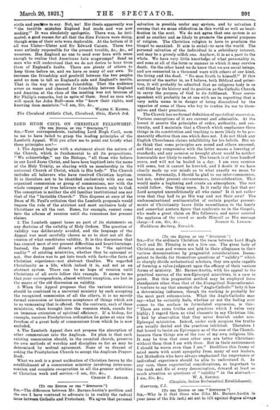LORD HUGH CECIL ON CHRISTIAN FELLOWSHIP. (To THE EDITOR OF
THE " SPECTATOR."] Ste,—Your correspondents, including Lord Hugh Cecil, seem to me to have failed to grasp the leading principles of the Lambeth Appeal. Will you allow me to point out briefly what those principles are?—
1. The Appeal begins with a statement about the nature of the Church, which is fundamental to all its propositions. "We acknowledge," say the Bishops, "all those who believe in our Lord Jesus Christ, and have been baptized into the name of the Holy Trinity, as sharing with us membership in the universal Church of Christ, which is His body." The Church includes all believers who have received Christian baptism. It is therefore not to be identified exclusively with any one organized communion or group of communions, nor with the whole company of true believers who are known only to God. The conception is neither the old familiar institutional one nor that of the "Invisible Church." This disposes at once of the Dean of St. Paul's criticism that the Lambeth proposals would impose the rule of the strictest and most exclusive body of Christians on all the rest. Rome, for example, cannot come into the scheme of reunion until she renounces her present dolma.
2. The Lambeth appeal bases no part of its statements on any doctrine of the validity of Holy Orders. The question of validity was deliberately avoided, and the language of the Appeal was most carefully chosen so as to shut out all dis- cussion of what constitutes validity. It is this discussion that has created most of our present difficulties and heart-burnings. Instead, the Appeal directs attention to " the spiritual reality " of existing ministries, whether they be episcopal or not. Our desire was to get into touch with facts—the facts of Christian experience—not abstract theolies. We regarded Christianity as a life, which indeed it is, and not as an abstract system. There can be no hope of reunion until Christians of all sorts follow this example. It seems to me that your correspondents, almost without exception, are lost in the mazes of the old discussion on validity.
3. When the Appeal proposes that the various ministries should be combined in a universal ministry by each accepting the recognized commission of all the others, it is no merely formal concession or insincere acceptance of things which are to us unmeaning that is offered. On the contrary, each of these ministries, when brought into the common stock, stands for an immense extension of spiritual efficiency. If a bishop, for example, receives Presbyterian ordination lie gains at once the freedom of a great body of communions from which he is now excluded.
4. The Lambeth Appeal does not propose the absorption of other communions into the Anglican. Its plan is that each existing communion should, in the reunited church, preserve its own methods of worship and discipline so far as may be determined by mutual agreement. None of us dreamt of asking the Presbyterian Church to accept the Anglican Prayer- Book.
What we seek is a great unification of Christian forces by the establishment of a communion ministry involving inter-com- munion and complete co-operation in all the greater activities of Christian work and service.—I am, Sir, &c.,
CHARLES P. ARMAGH.


































 Previous page
Previous page